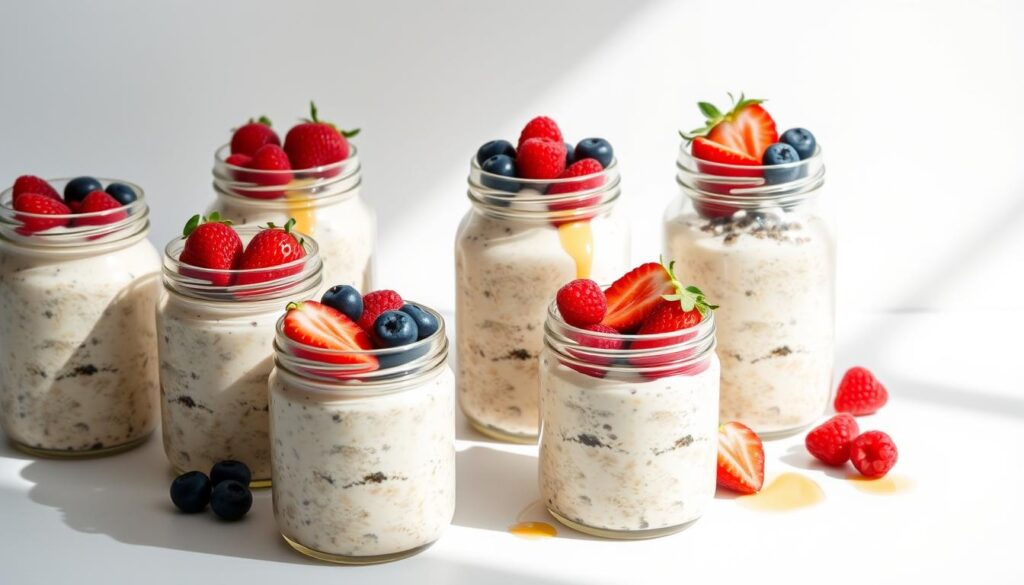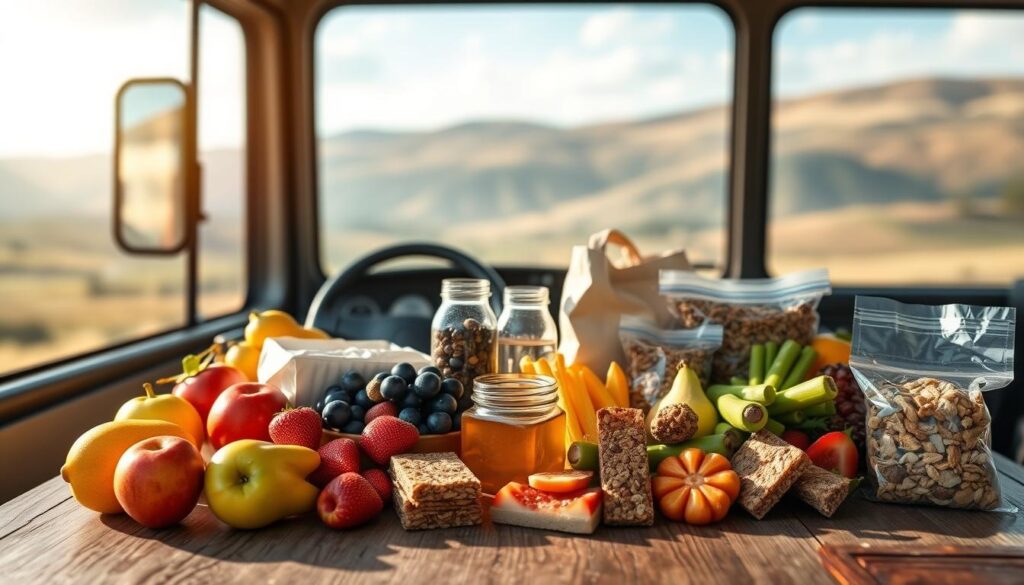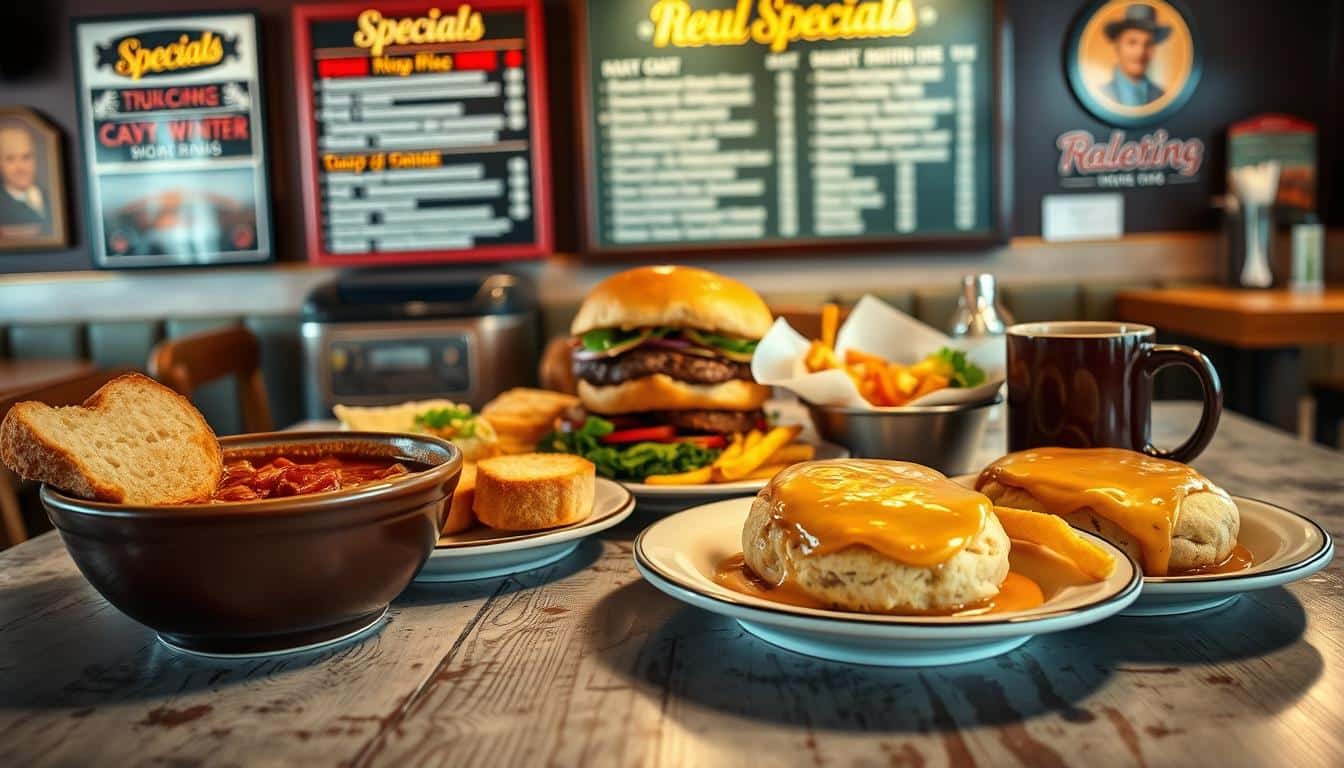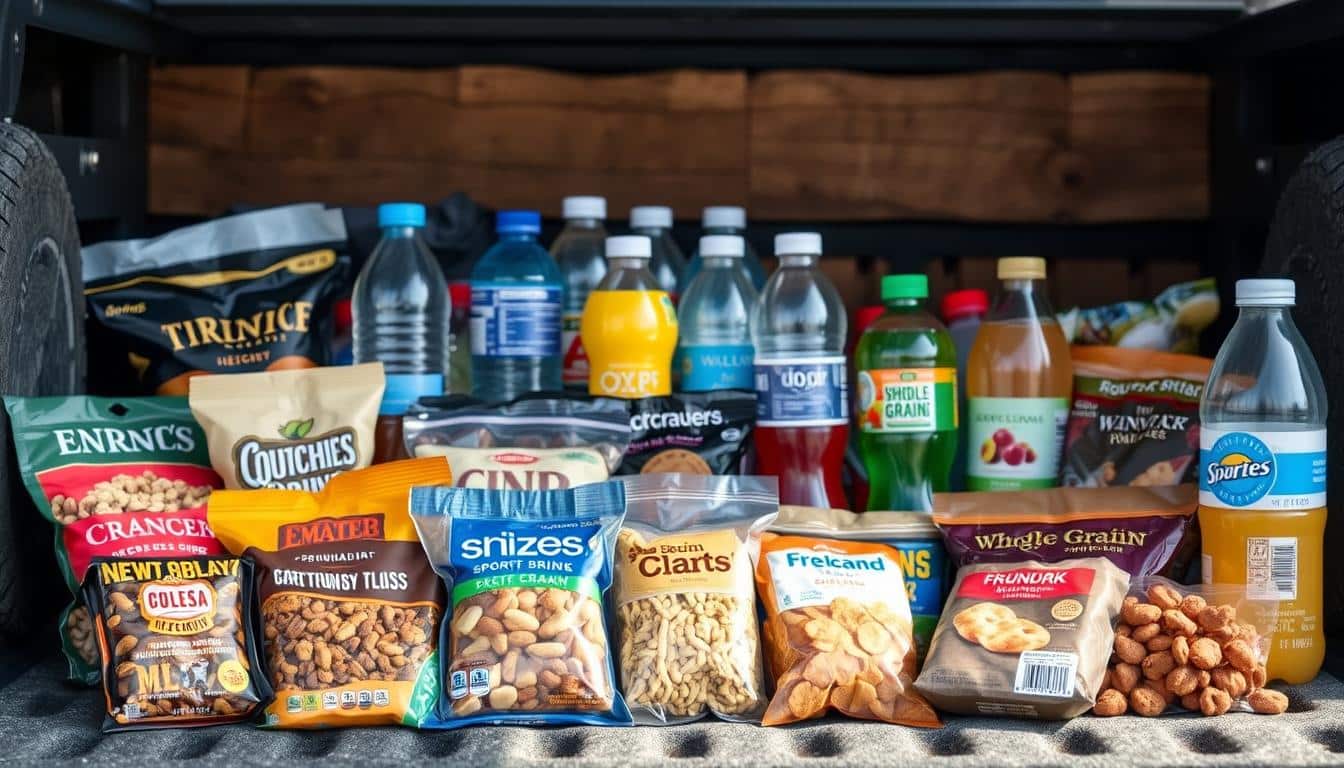Long drives and tight schedules often lead drivers to choose diners and truck stops. These options may be easy but they’re not cost-effective or healthy. By using a 12-volt slow cooker or a small electric cooker, truckers can enjoy meals that are warm, less expensive, and better for them.
Meals like three-ingredient chicken, pot roast for two, and pulled pork with barbecue sauce are perfect for the cab. They require minimal prep and use little space. This means drivers can have tasty meals even when bad weather or delays keep them parked.
With gear like rice cookers, small skillets, and coolers, the variety of meals one can make expands significantly. Foods like one-pot pasta, jar salads, overnight oats, and tuna or chicken salad are easy to make. These tools and simple planning can transform a truck cab into a reliable kitchen, helping drivers save money and eat healthier while on the road.
Why DIY Cab Cooking Saves Money and Boosts Health
Cooking in your cab can change your life on the road. Using a 12-volt slow cooker or a tiny electric skillet, you can make simple meals. This way, drivers can enjoy hot dishes like pulled pork or pot roast, and save money.
Dining at truck stops can quickly become expensive. Just a breakfast plate, a burger, and a drink might cost you more than groceries for a day. If you keep track of what you spend at truck stops, you’ll see how quickly it eats into your earnings. Opting for a slow-cooker meal can cut down on the need to spend money on expensive food.
It’s smart to keep budget-friendly basics in your cab. Items like canned tomatoes, rice, and pre-cut veggies can extend your meals. They help save on food costs and let you make dishes like one-pot pasta easily. With these ingredients, you can vary your meals to keep things interesting.
Making your own meals also means you control what you eat. A lot of truck stop meals are packed with fat and salt. But if you cook for yourself, you can pick healthier options. This helps keep your meals healthy and gives you better energy for driving.
Planning your meals helps avoid buying food on a whim. By portioning out snacks and planning a few meals, you keep cravings away. Start with planning just one meal or a week’s meals to make it a habit. Thermoses and coolers help keep your food fresh, so you don’t have to stop for fast food.
- Track truck stop costs and compare them to in-cab meal prices.
- Stock up on affordable staples to reduce food expenses.
- Pre-portion snacks to avoid impulse purchases on the road.
- Choose recipes that support healthy trucker meals and steady energy.
Essential Portable Cooking Gear for Truckers
Having the right tools in your cab means you can enjoy fresh meals on the go. Using small appliances and smart storage helps maintain great taste, saves money, and reduces the need for frequent truck-stop visits. Choose equipment that fits in small spaces and works with a 12-volt socket or a compact inverter.
Begin with a small slow cooker that connects to your truck. A 12-volt slow cooker or a portable crockpot serves one to two people. It’s perfect for preparing stews, chili, or oatmeal before starting your day. These appliances cook food safely and let you enjoy a home-cooked meal without needing a full kitchen set-up.
Add more choices with tiny electric gadgets. Portable electric cookers, rice cookers, and mini skillets can manage pasta, rice, veggies, and quick stir-fries. A compact skillet or lunchbox oven needs little space and heats up food fast.
- Portable crockpot for soups and shredded chicken
- Rice cooker for grains and batch cooking quinoa
- Small skillet for eggs, stir-fries, and grilled sandwiches
Keep your fresh food cold with the best cooling equipment. A fridge in your truck or a top-notch portable cooler keeps dairy, fruits, and prepped meals fresh. Use thermoses for soups and hot drinks so your meal stays warm for hours.
Plan your meals with small storage solutions. Mason jars are great for layered salads and overnight oats because they keep everything fresh. Stackable containers, zipper bags, and a compact cutting board help cut down waste and make meal prep quicker.
- Mason jar salads for quick lunches
- Clear food containers for easy meal planning
- Portion bags to keep snacks fresh and prevent waste
Try out a basic kit at a truck stop or rest area. A good set for trucker kitchens should have at least one 12-volt slow cooker or portable crockpot, a small rice cooker or skillet, a fridge or cooler for the truck, and ready-to-eat mason jar salads. This setup keeps your meals varied, nutritious, and simple while on the road.
Meal-Prep Basics for Long Hauls
Long trips need easy routines that save time, money, and stress. Start with easy steps and make habits that match road life. Planning ahead stops last-minute food stops. It keeps meals steady and good.
Start small: planning one meal or one week
Start with prepping one meal, like dinner for three nights or lunches for a week. Use a small slow cooker or a 12-volt crockpot for just what you need. Planning weekly makes shopping regular and keeps your space neat.
Pre-portioning snacks to avoid mindless eating
Divide snacks into little bags or jars. Take along trail mix, nuts, apple slices, and carrots with hummus. This way, you won’t buy snacks on impulse. It also helps you eat the right amount.
Choosing recipes that don’t require reheating
Go for meals that don’t need heating if you can’t use an oven or microwave. Try wraps, tuna or chicken salads, jar salads, and boiled eggs. These foods are quick to make and good at any temp.
Using leftovers creatively to cut prep time
Use dinner leftovers for new meals to cut down prep time. Make chicken sandwiches, stir stew into breakfast eggs, or add roast veggies to grain bowls. Simple changes keep meals interesting without more shopping.
- Prep one protein to use in three ways.
- Keep sauces and dressings on the side to keep meals fresh.
- Change your menu every two weeks to keep things fun.
Trucker-Friendly Recipes
Simple meals make a trucker’s life easier on the road. Here are three easy recipes perfect for tight spaces. They save time and reduce clean-up. All you need are pantry staples and basic cooking gear.
- Use a portable cooker or a small skillet. Mix in dry pasta, a can of low-sodium tomatoes, pre-cut bell peppers, spinach, and water. Stir well, cover, and cook until the pasta is tender.
- Top it off with a sprinkle of olive oil, some grated Parmesan, and black pepper. This one-pot pasta recipe minimizes dishes. It’s also great with frozen or pre-cut veggies for a quick, warm meal.
Veggie skillet stir
- Throw pre-cut broccoli, carrots, and bell pepper into a hot skillet with some oil. Then add pre-cooked chicken, tofu, or tempeh for protein.
- Flavor it with low-sodium soy sauce and a little sesame oil. This veggie stir-fry is trucker-friendly. It packs bold flavors using simple items and cooks quickly.
Protein-packed tuna or chicken salad
- Combine canned tuna or chicken with mayo or Greek yogurt, chopped celery, red onion, and lemon juice. Season with salt and pepper to your liking.
- Enjoy with whole-grain crackers, bread, or inside a wrap. These tuna or chicken salad recipes are quick to make. They don’t require heating and are perfect for on-the-go lunches.
Slow Cooker Meals Perfect for a Cab
Compact slow cookers turn a truck cab into a tiny kitchen. Choose recipes needing little prep for a small cooker. This keeps meals tight and waste low. It lets drivers enjoy home-style meals on the go.
Here are four easy slow-cooker meals for solo drivers. Each fits a small crock pot with little prep needed. Bring a thermos to keep soups or stews hot when you can’t reheat them.
-
Simple Crock Pot Chicken — This meal needs only three ingredients and five minutes to prepare. Just mix chicken breasts, a jar of sauce, and a seasoning packet in your cooker. Enjoy it with bread or warm biscuits. It’s enough for two nights.
-
Slow Cooker Pot Roast for Two — Pick a small beef cut and two or three baby veggies. This five-ingredient meal is perfect for small spaces. It cooks slow to make the meat tender. Serve with green beans or carrots on the side.
-
Pulled Pork for the Road — Cut a pork shoulder in half for this recipe. Add a small can of root beer and barbecue sauce. Trim the fat, season well, and shred it when it’s cooked. Serve on buns for easy eating at stops.
-
Apple Cinnamon Crock Pot Oatmeal — Use apples, cinnamon, oats, milk, and a bit of brown sugar. This six-ingredient meal is great for dessert or breakfast. Add ice cream at night or nuts in the morning.
Prep tips: Cut vegetables before your shift and keep in mason jars. Put spices in small bags. Choose crockpots that fit your space well. These steps save time, letting you focus on driving.
Quick Breakfasts to Fuel a Drive
Breakfast is key for focus and energy during long drives. It’s easy to make mornings smoother with simple prep and sturdy containers. Choose recipes that are still delicious cold or warm, and easy to take with you.

Overnight oats jars are great for truckers. Just layer oats, milk or yogurt, and fresh fruit in mason jars. To keep energy up, add nuts, chia seeds, or peanut butter. Keep them in a cooler or truck fridge to grab and go.
Eggs are perfect for a protein-packed start without a lot of work. Try making an egg bake in a lunchbox cooker or small oven. Or mix eggs with veggies, cheese, and ham, cook in a portable cooker, and microwave when ready to eat.
- Boiled eggs: cook a bunch and keep them in the fridge.
- Choose muffins with oats, nuts, and fruits for a fiber kick.
- Have energy bars and fresh fruit on hand for busy days.
An egg bake is a smart choice for limited space. Bake an egg casserole in a lunchbox cooker or toaster oven. Then cut it into slices for easy reheating on the go. This mix of convenience and home cooking offers consistent, good meals during trips.
Prepare easy meals on Sunday to last the week. Fill jars with overnight oats, portion out boiled eggs, and get burritos ready for the microwave. This planning saves money, stops fast food runs, and keeps energy steady on the road.
Easy Lunches and Wraps for the Road
Lunch on the road means quick, tasty, and simple storage meals. Choose foods that stay fresh in a cooler or fridge. Prepare them the night before, pack in an insulated bag, and eat without stopping for too long.
Jar salads remain fresh if you layer them right. Dressing goes at the bottom, then hardy veggies, proteins, and leafy greens. Mason jars keep everything separated until it’s time to shake and eat. Truckers love these salads because they avoid soggy salads and messy eating.
- Layer ideas: vinaigrette, chickpeas, cucumbers, shredded carrots, grilled chicken, baby spinach.
- Storage tip: keep jars upright in a cooler or small fridge to stay fresh longer.
- Prep batch: make three to five jars on Sunday for a week of easy lunches.
Wraps offer a fast, portable lunch for truckers on a tight schedule. Use whole-grain tortillas or lettuce for less carbs. They can be filled with turkey, avocado, and peppers, with hummus to keep it from becoming soggy.
- Choose lean protein or deli turkey for lower fat and calories.
- For easy meals, layer turkey, spinach, shredded carrots, and a thin spread.
- Trucker-friendly turkey wraps maintain well in parchment or foil.
Protein bowls are a hearty, flexible option in just one dish. Begin with quinoa, brown rice, or greens. Add your choice of protein, veggies, and dressing or lemon for flavor.
- Mix-and-match: tofu, grilled chicken, or salmon go great with beans and corn.
- Keep dressings separate to maintain freshness.
- Truckers depend on protein bowls that are simple to warm up or eat as is.
To make choices easier, keep a list of favorites on the fridge door. Switch up the ingredients to keep things interesting. Add fresh fruit or yogurt on the side. These tips help you stay energized, save money, and skip heavy fast food.
Smart Dinner Ideas to Replace Truck-Stop Meals
Truck-stop meals are often too heavy and costly. You can save money and eat healthier with a few simple changes. Use a small slow cooker for stews and pot roasts. A skillet is great for quick stir-fries. And don’t forget foods that grill or wrap easily.
-
Chili, soups, and stews made ahead
Make a big batch in a compact crockpot the night before. You can have pork chops, beef stew, or BBQ chicken. They stay tasty and are easy to reheat. Add carrots, onions, and small potatoes to get more fiber and vitamins.
Use jars or insulated containers if you’re short on space. This way, you have warm dinners ready. And you won’t spend too much at roadside stops.
-
Stir-fry dinners on the go
Stir-frying is quick and can be healthy. Just choose low-sodium soy sauce and fresh or frozen veggies. Pre-cooked chicken, shrimp, or firm tofu will save you time.
With a small nonstick skillet and a tight lid, you can steam and toss easily. Serve it over quick rice or whole-grain noodles for a complete meal.
-
Quesadillas and loaded baked potato foil packets
Quesadillas can be made many ways. Try whole wheat tortillas with cheese, beans, and salsa. Cook them on a griddle or portable stove until they’re crispy.
For the foil packets, just slice potatoes and add a bit of oil, herbs, and toppings like broccoli or cheddar. Cook them on a grill or hot plate. They’re easy to take with you and go well with salad or soup.
Switch these ideas up to keep meals interesting. Bring along spices, low-sodium sauces, and some fresh veggies. Your meals will be varied, delicious, and less expensive than eating at truck stops.
Healthy Snacking and Dessert Options on the Go
Keeping tasty, quick snacks in the truck helps with the long drives and beats fast food stops. Choose snacks that keep well and boost your concentration. They should also be a treat when you crave something nice.

Fresh fruit, pre-cut veggies, and hummus
- Pack apples, bananas, grapes, and clementines for a quick energy boost. Keep grapes cool to stay fresh.
- Carrots, cucumbers, and bell peppers go great with hummus cups for an easy snack.
- Try fruit salads or skewers with a sweet honey-lime topping for a yummy option on the move.
Trail mixes, nuts, and portioned popcorn
- Mix almonds, walnuts, pumpkin seeds, and a bit of dark chocolate for a healthy snack.
- Use small bags or containers for snacks to help you eat just the right amount.
- Lightly salted air-popped popcorn or popcorn with nutritional yeast is tasty without being too fatty.
Light desserts: frozen grapes, fruit bars, and simple ice cream treats
- Frozen grapes are a cool, sweet snack perfect for a quick dessert without the candy.
- Fruit bars or frozen ice pops are great when you want something cold and refreshing fast.
- Bring along ice cream sandwiches in a cold pack for a special treat on shorter trips.
Mixing fresh fruits with nuts or whole-grain crackers helps keep your energy levels stable. These snacks are not just healthier but also more enjoyable compared to the usual options.
Be smart with your snack choices: keep an eye on expiration dates and have a cooler handy. Having these snacks ready means you can enjoy tasty and healthy options anytime during your journey.
Food Safety, Storage, and Cab Organization
Keeping food safe while traveling is key. It can be as simple as keeping your cab clean, checking food temperatures, and organizing your storage. This approach helps truckers depend less on food from diners. With small slow cookers and fridges in the truck, meals become safer and more comforting. This is especially true during long trips or unexpected bad weather.
Keeping perishables cool with portable coolers and fridges
For keeping food cool, use a portable cooler or a 12V fridge. Make sure perishables stay under 40°F. Top-quality coolers like those from YETI or Dometic are best. They keep temperatures low for a long time when used with frozen ice packs. Using mason jars and sealed containers helps keep food fresh and prevents leaks.
Safe reheating practices and when to use a thermos
When you can use a microwave or rice cooker, reheat leftovers to 165°F. If you can’t reheat food, a stainless thermos filled with boiling soup or chili keeps it hot for hours. Keeping food safe in a thermos means heating the thermos first. Then, quickly fill it to keep the heat in and bacteria out.
Labeling, rotation, and trash management in a small space
Use labels with dates on your containers and always use the oldest food first. This is called first-in, first-out rotation. It helps prevent food from going bad. Put snacks in single-serve bags to cut down on open containers and crumbs. Have a small, sealable trash bin and empty it every day. This helps stop bad smells and pests.
- Pack meal kits in clear containers for quick checks.
- Store raw and cooked foods separately to prevent cross-contamination.
- Keep a digital thermometer on hand to verify temperatures.
trucker-friendly recipes
Cooking in a cab means being smart with swaps and keeping portions small. You should use compact gear and few ingredients. This saves time and keeps meals fresh. Follow the tips to make recipes work in small slow cookers and 12-volt units. It keeps variety and nutrition in your road diet.
- Cut quantities to fit a 2- to 3-quart crockpot. For pulled pork or pot roast, pick smaller cuts like Boston butt or a petite chuck roast.
- Reduce vegetables and liquid by about half to prevent overcooking in a small crockpot.
- Simple Crock Pot Chicken works well in 12-volt slow cookers for hands-off meals that require minimal prep.
Scaling portions and swaps
- To scale portions trucker-style, halve standard family recipes for one to two meals. Quarter recipes when needed and freeze extras in single-serve containers.
- Repurpose leftovers: roast turns into sandwiches, salads, or breakfast egg bakes.
- Swap proteins and grains to stretch variety. Use canned tuna instead of cooked chicken, or quinoa in place of rice for faster cook times.
Seasoning advice for small kitchens
- Keep a compact spice kit: salt, black pepper, garlic powder, chili flakes, and a multipurpose sauce like low-sodium soy or barbecue sauce.
- Use seasoning tips truck cooking to vary flavor without bulky jars. A dash of hot sauce or a sprinkle of smoked paprika changes profiles quickly.
- Choose low-sodium canned goods and lean proteins to control salt and calories while keeping meals tasty.
Use portable tools like lunchbox cookers and 12-volt slow cookers to make small meals. Thinking of trucker needs helps keep food fresh and cuts down waste. Learn a few seasoning tricks for truck cooking. This makes each meal seem new without taking up too much space.
Conclusion
Making meals in the cab with a small slow cooker and simple tools brings big perks. You spend less, skip a lot of fast food, and enjoy cozy meals like Simple Crock Pot Chicken. You can make pot roast for two, pulled pork, and apple cinnamon oatmeal. These recipes are perfect for truckers and show that you can turn a tiny space into a handy kitchen. This keeps drivers full and happy.
With handy cookers, rice cookers, cool bags, and easy one-pot dishes, meal prep is a breeze. You can make pasta, stir-fries, wraps, and salads in a jar. Preparing snacks beforehand, using thermoses, and having a fridge in the truck cuts down on trash and cleanup. It also brings more variety to meals during long trips.
Planning meals carefully, controlling portions, and keeping food safe helps drivers watch their diet and save money. Start with simple steps, switch up meals to keep things interesting, and stick to some tried-and-tested recipes. This way, cooking in the cab can become a normal part of life on the road. Following these tips from trucker-friendly recipes leads to a more enjoyable and healthy journey.
FAQ
What are some easy, trucker-friendly recipes I can make on the road?
How does cooking in the cab save me money and improve my diet?
What portable cooking gear should I prioritize for cab cooking?
Are 12-volt slow cookers safe and practical in a truck?
How do I start meal prepping if I’m new to cooking on the road?
What snacks travel well and help avoid impulse buys at stops?
How can I keep perishable foods safe in the cab?
Which breakfast options are best for long hauls?
How do I adapt standard recipes to fit a small slow cooker or 12-volt appliance?
What are good dinner swaps to replace high-calorie truck-stop meals?
Can I prepare meals that don’t require reheating?
What small-seasoning kit should I carry to keep flavors varied?
How do I keep my cab tidy and manage food waste?
Where can I find truck-driving jobs or carrier partners that support in-cab cooking and long-haul life?
Content created with the help of Artificial Intelligence.



